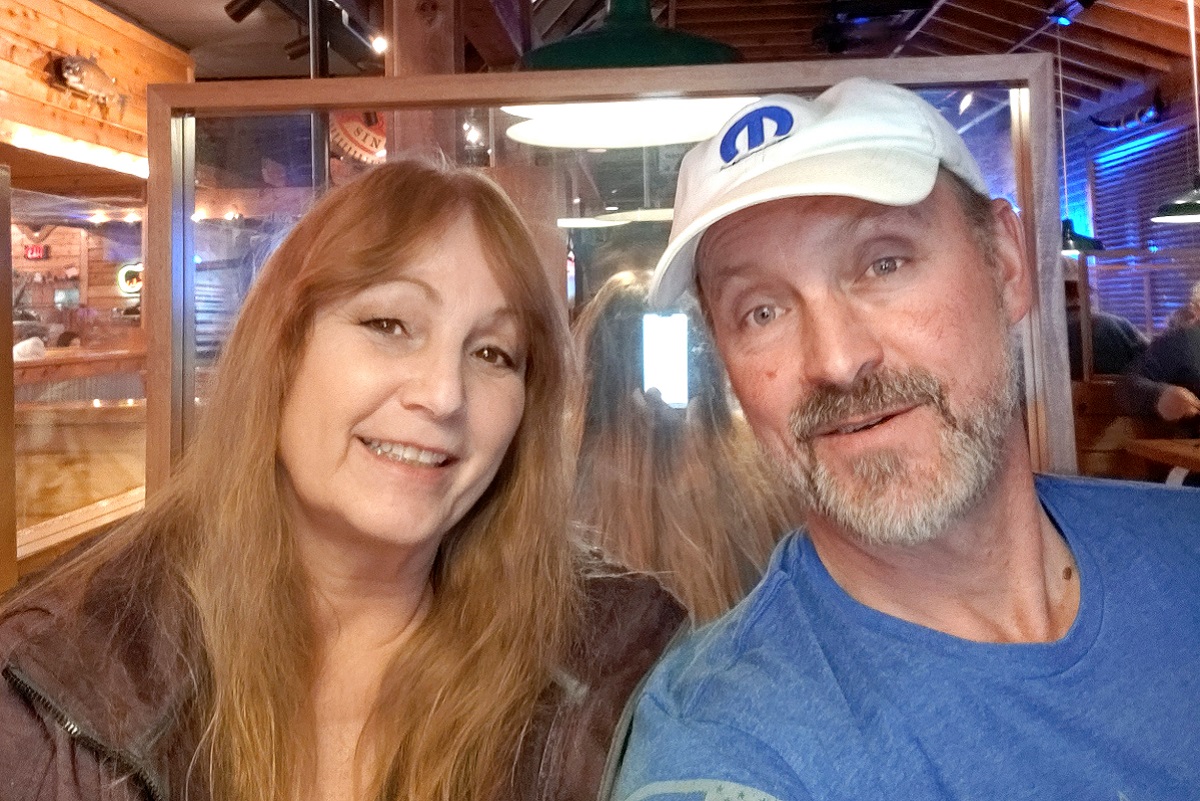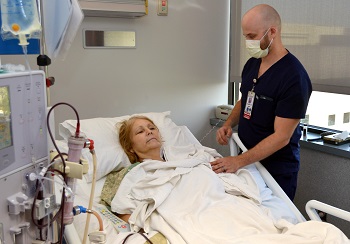New Program at Saint Alphonsus Saves Emmett Woman’s Life
April 17, 2023
By: Saint Alphonsus Communications Team
Categories: Medical Innovations
Saint Alphonsus Debuts Heart and Lung Support Program for Most Critically Ill Patients
Leah LeBlanc didn’t feel quite right as she did housework late in July at her home in Emmett. She felt tired and had some pressure in her chest, but she ignored it and carried on. The next day, her husband, Paul, was concerned as Leah began throwing up, felt extremely weak and dizzy. They suspected her symptoms were related to her diabetes or a recent bout of COVID-19.
A visit to the family doctor didn’t offer a diagnosis, but instead a suggestion to go to the Emergency Room.
At Saint Alphonsus Regional Medical Center, a 34-mile trip from Emmett, an EKG done in the Emergency Department revealed a failing heart; Leah had suffered a heart attack and was in dire condition. A cardiologist determined that three major arteries in her heart were blocked, so they inserted stents to force her arteries open. The doctor concluded the heart problems were the result of Leah’s uncontrolled diabetes.
Paul says the cardiologist who treated his wife braced him for bad news; they weren’t sure whether Leah would survive the heart attack.
She was immediately rushed to the Cardiac Catheterization Lab where an Impella pump was inserted to assist Leah’s weakened heart. The Impella is a tiny pump that is implanted in a patient to assist the heart’s function. It essentially gives the heart a chance to rest and heal. Unfortunately, after 24 hours, it became clear to doctors in the ICU that the Impella couldn’t do the job by itself. Doctors initially consulted with the University of Utah hospital in the event she would have to be transferred there for a heart transplant.
Instead, Leah was placed on a venous arterial ECMO (extracorporeal membrane oxygenation) – a machine that does the work of the heart and lungs, pumping and oxygenating her blood and moving it around her body so the other organs like the brain, the liver, the kidneys, all the other organs that need continuous blood flow are able to receive it. It is designed to allow the heart to completely rest and recover. Besides having the Impella in her and being on the ECMO machine, Leah was also on a ventilator to help her breathe. Leah says doctors at Saint Alphonsus told her she was “the sickest patient in the hospital.”
“It’s as close as you can come to dying without dying,” says Dr. Jeffrey Heslop, Saint Alphonsus Interventional and Structural Cardiologist. “ECMO allows us to keep people alive until they have a chance to recover. It’s a temporary measure. But if we can keep the brain alive and keep the other organs alive while the heart recovers, that’s really what that therapy offers.”

dialysis at Saint Alphonsus Regional Medical Center.
The ECMO program at Saint Alphonsus is growing, giving the hospital and health system the ability to treat the most critical of cases without transferring the patients out of state. Saint Alphonsus has two ECMO program coordinators, and a care team that is led by advanced heart failure cardiologist Dr. Sophia Airhart and includes the critical care team in the ICU, cardiothoracic surgery, interventional cardiology, respiratory, physical and occupational therapists, nutritionists, pharmacists and experienced perfusionists and bedside nurses. “It is this foundation of teamwork that creates excellent patient care,” Dr. Airhart says.
She serves as the MedHical Director of Heart Failure and Mechanical Circulatory Support. She brings a wealth of experience with regards to caring for patients requiring advanced support such as ECMO. She envisions significant growth in the ECMO program for both heart and lung failure and are currently building a durable left ventricular assist device (LVAD) program. An LVAD is a mechanical pump implanted in the patient’s chest to assist the heart in pumping blood. The patient can go home with the device, and it can be used as therapy or a bridge to heart recovery or a heart transplant.
“It’s very exciting to think about what we’re going to be able to do (with the ECMO program),” says Dr. Wesley Pidcock, MD, ICU Medical Director at Saint Alphonsus. “As this program gets bigger and bigger, and we get more comfortable with it, the possibilities of what we could do down the road, meaning helping more people like her.”
Pidcock says his goals for the Saint Alphonsus ECMO program is to treat patients locally, so they don’t have to be transferred to Salt Lake City, Portland, or Seattle for this advanced type of care.
After five days in the Intensive Care Unit (ICU), Leah’s heart recovered enough to allow her to be removed from the ECMO, but the Impella device remained, to reduce the strain on her heart. That device came out one day later. She remained on dialysis due to kidney illness but was able to be moved from the ICU.
Finally, in mid-September, Leah was discharged. Recovery has been slow and steady, and for Leah, a bit frustrating. “I would just want to do things so to me it’s gone slow,” she says. “It’s been frustrating and then sometimes on the hard days I get a little depressed because then that slows me even more.” As she gets better, she’s able to spend more time with her five children and 13 grandchildren.

Amber Kirtley-Perez, PA-C to check her progress
after discharge.
Dr. Heslop, the cardiologist, says it’s not unusual for women to ignore the warning signs of a heart attack. He says women tend to care for others and disregard their own discomfort. “People kind of get the sense something’s not quite right. And when you get that sensation, pay attention to it. It doesn’t necessarily mean something’s wrong with your heart, but I think the moral of this story is, if something feels off, then get checked out.”
Leah agrees. “If you feel funny or you have any kind of weird feeling inside your body, go have it checked. Because I would get exhausted like cleaning the tub and stuff, but I just figured I’m lazy or something, so I just push through it.”
Leah, her husband, and the doctors agree on one thing: Without the ECMO program at Saint Alphonsus, she would have died. Paul credits Saint Alphonsus’ doctors, nurses and staff and the power of prayer. “I know God had his hand on Leah's heart,” he says.
Leah put it best: “There are no words to express my thanks. Everyone is a hero.”
